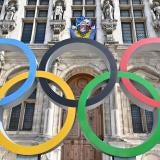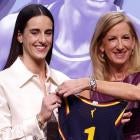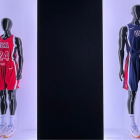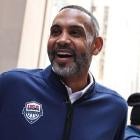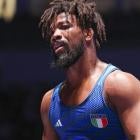 |
| Mo Farah won the 5,000 and 10,000. In doing so, he became Britain's most beloved active Olympian. (US Presswire) |
And like that, the Games are done. Sixteen days gone; it always happens so fast. So, enjoy the rest of the weekend, Monday will be here with the turn of your head, and then it's back to your normal sports-viewing schedule. Football's just around the corner, followed by the baseball postseason. Fall: the best season for sports, unquestionably.
It's why I love the Summer Games so much. It brings more than two weeks worth of breakup to the hottest season's most boring monotony of baseball games and endless preseason NFL stories.
But before you leave the Olympics behind you, one more sweeping look back at what we just took in? Below, take a look at what we whittled down to the 10 best stories of London's Games. These aren't necessarily the biggest -- though naturally some of the headliners made their way in. These are what Jerry Hinnen, Matt Moore, Bryan Fischer and myself feverishly -- seriously, things got a bit heated; Moore and I aren't on speaking terms until at least Tuesday and not until he says sorry first -- debated before begrudgingly coming to a conclusion.
(An aside: we've already addressed all the girl power from these Games. That stands above all as the biggest story, the most overarching one, too.)
A few years from now, most of these stories will be peripheral. At best, only three or four will stand out still, the way Beijing's Games primarily only bring to mind Phelps' eight golds, Bolt's breakout performances and that unprecedented, brain-blowing opening ceremony. Aside from those three things, what else can you recall from '08?
In the immediacy of this Olympic ending, here's what we want to remember most, the best stories the 2012 Games had to offer.
10. USA women's water polo -- the best story you probably missed at these Games. Brenda Villa and Heather Petri were there in Sydney in 2000, when the Americans made the gold medal match of the first Olympic women's tournament and fell to the host Australians. They were there four years later in Athens, when they were gold medal favorites before being upset in the semifinals by Italy, 6-5. They were there in Beijing in 2008, when they were even heavier favorites and made the final after dramatically knocking off their Aussie archrivals, only to give up a goal to the upstart Netherlands with eight seconds remaining, lose 9-8, and settle for the silver--again. -- JH
 |
| James, right, shares a postgame moment of gold with Kevin Durant. (US Presswire) |
9. LeBron completes best basketball year ever? LeBron James may not have completed his journey from NBA pariah to celebrated American leader, but he probably swung a lot of independent voters in these Olympics. James was far and away Team USA's best player, swarming defensively while also playing center, working in the post and dishing to open shooters, bull-rushing the rim and hammering dunks in transition.
And he was even humble after the game, telling NBC's Craig Sager when asked about his accomplishments over the past three months, "This is all about USA." James has embraced the role as a pillar on Team USA like no other. There was no question about his involvement in these Olympics like there were for other players. No waffling. He was in from the get-go. He has taken the obligation seriously. He never sought to upstage Kobe Bryant, the leader and spokesman for the team. -- Matt Moore
8. As if it was possible, Phelps exceeds expectations. Because Bolt (who we get to on this list a bit further down) took over the second week of the Olympics, just like when Michael Phelps uncontrollably passed the baton to him in '08, it seems like the greatest swimmer in the history of all we know swam about two months ago at this point, doesn't it? Let's not allow recent event overshadow that ultra-impressive first week of Phelps'.
Some could make the case Phelps wasn't one of the 10 best London stories because he wasn't perfect like the last time and he didn't break seven world records like the last time. But: unparalleled success in the pool and the fact he did it when plenty expected/wanted Ryan Lochte to be the American swimming star this time around. Couldn't you make the case Lochte was third? He had to be behind Phelps ... and probably Missy Franklin.
Phelps wasn't flawless, but ultimately I think that's why we should be awed by him and his story for this final go-round. He was always going to get his medals, but this many? Getting it up to 18 golds and beating Lochte in the 200-meter IM? The best ever, now by a margin wider than anything any swimmer can conquer for years to come. -- Matt Norlander
 |
| From left: USA goalkeeper Nicole Barnhart, Abby Wambach and Alex Morgan. (US Presswire) |
7. The U.S. women's soccer team survives the greatest women's soccer match of all time, finds redemption vs. Japan. How epic-beyond-epic was Team USA's 4-3 win over Canada in their Olympic women's soccer semifinal? London newspaper the Guardian named it the best knockout soccer match played anywhere, in any major tournament, by teams of any gender, since the legendary World Cup match between West Germany and France ... in 1982. And remember: the Brits (like most of Europe) aren't exactly ones to go out of their way to pay women's soccer a compliment. Simply calling it the greatest soccer match ever played in the women's game still might be selling it short.
6. Katie and Claressa: the best boxing stories in years. Boxing feels less and less embraceable by the year. The men's boxing portion of these Olympics were marred by crooked matches, ejected judges and thin-skinned officials. But there were two stories that made this sport worth all the hassle. American Claressa Shields and Irishwoman Katie Taylor. One set a new standard for her country; the other stopped her country from doing anything, as millions watched her punch her way into infamy.
Shields is the 17-year-old from Flint, Mich., the girl who is the next breed of female fighter. She won gold in the heaviest weight class offered at these Olympics. Chances are, the IOC will have to allow another weight class higher for the 2016 Games just to properly place here. And even then, how will she be stopped? Her fighting is only part of it. She's a child of separation: from her parents, from a normal life. She chose not to live with her mother because she felt it would affect her chances at good grades and making the Olympics. You put 1 million 11-year-olds into Claressa Shields' situation six years ago, and I don't know if another one comes out of it the way she is.
And as for Taylor? Outside of No. 1 on our list, I don't believe any country was as emotionally vested in one of its Olympians than the Irish were with her. It's a stunning story. The country's first gold in 16 years was won by a female boxer. Forget it. I can't say anything that will top the justice Dan Wetzel did on Taylor in this incredible column. -- MN
5. Gabby Douglas powers "Fab Five" to gold medal, wins individual all-around. It's not just that no American woman had ever won team gold and followed it up with a victory in the individual all-around. It wasn't just that she entered London as the supposedly less-reliable, more flighty member of the "Fab Five" next to teammates Aly Raisman and Jordyn Wieber, and wound up as the U.S.A's most consistent performer. It wasn't just that her electric routine on the floor was the moment that clinched that gold medal over Russia once. It wasn't just that she became the first woman of color, of any nationality, to win the all-around. It wasn't just that she did so as the pre-meet favorite, the single gymnast with more pressure on her seemingly slight shoulders than any other.
It was that she did so, we would argue, with the most engaging personality, the most joy, and the most megawatt smile of any American gymnast since Mary Lou Retton. If 28 years from now she's not remembered every bit as fondly as Retton is today, I'll be shocked. -- JH
4. Oscar Pistorius: unique, groundbreaking Olympian. From the opening ceremony to the closing one, there is an underlying theme of sportsmanship, of competition and of spirit at the Olympics. It is hard for any Olympian the past few months to represent those tenants and pursue the motto of the Games -- faster, higher, stronger -- better than South Africa's Oscar Pistorius. A double-amputee, he fought like mad to be allowed to compete and, after a hiccup here and there, came the amazing sight of his carbon fiber prosthetics swiftly moving down the track in the 400 meter heats.
There was talk coming into London about Pistorius' advantage but we quickly came to realize that he had none, finishing last in the individual semifinal and in the 4x400 relay that he anchored. That's what made his story so compelling however, that despite obstacles there was somebody who overcame them to become an Olympian. He was an inspiration to millions and not just to those missing a limb or with a chip on their shoulder. Oscar Pistorius ran like everybody else in London and that was a remarkable feat no matter how you look at it. -- Bryan Fischer
 |
| Bolt finishing out the 200-meter final from Thursday night. It was never in doubt -- the race and his legend. (US Presswire) |
3. Usain Bolt is a legend that's for sure. Lightning can strike twice. In the case of Usain Bolt, that rare occurrence propelled him into history and made him an Olympic legend. His races – and at this point they are certainly his – are always among the most watched track events at the Games but in 2012 the Jamaican sprinter made the 100m, 200m and 4x100m relay spectacles for the world to see and far more meaningful than just must-watch television.
From a slow start each time came the split second where every one's heart skipped a beat and jaw dropped as the tall, lanky Bolt whooshed past the field and on toward the finish line without anyone near. There was also the celebration before crossing said finish line that made it look like he was simply toying with the competition while giving the people of the world what they wanted most: a show. He even paid homage to the hometown favorite by doing the “Mo-bot” a few times. The appropriately named Bolt ran himself into history in London, becoming the first man to ever win the 100m and 200m in consecutive Summer Games but doing so with his flashy grin and entertaining style helped cement himself as a legend. -- BF
2. Kayla Harrison. Kayla Harrison did not make the front page of any papers. While the country was falling in love with Gabby Douglas, and the women's soccer team, Harrison quietly won gold in a sport Americans are unfamiliar with. The first gold medal in Women's judo for the United States belongs to Kayla Harrison, and that is merely the end, not the entirety, of her story. She became a hero to those that new her story, and inspiration worthy of her country's ideals of perseverance and dedication.
On Aug. 4, Team GB brought home six gold medals – three of which came within one magical hour (46 minutes to be precise) that likely will never be topped in the annals of British athletic history. Jessica Ennis, considered the darling of the women's squad, won the heptathlon and soaked in the Olympic Stadium crowd's adoration with a Union Jack draped over her. Long jumper Greg Rutherford, title sewed up, used his final jump as a celebratory hoo-rah. Finally, Mo Farah caused fans from Plymouth to Glasgow to rise to their feet and applaud as Farah crossed the finish line in the 10,000m. The next afternoon, Andy Murray capped off the remarkable British run by toppling one of the all-time greats to win at the most revered site for tennis in the world, Wimbledon. As "God Save the Queen" played each time there was little doubt about what those performances meant to the country. -- BF











